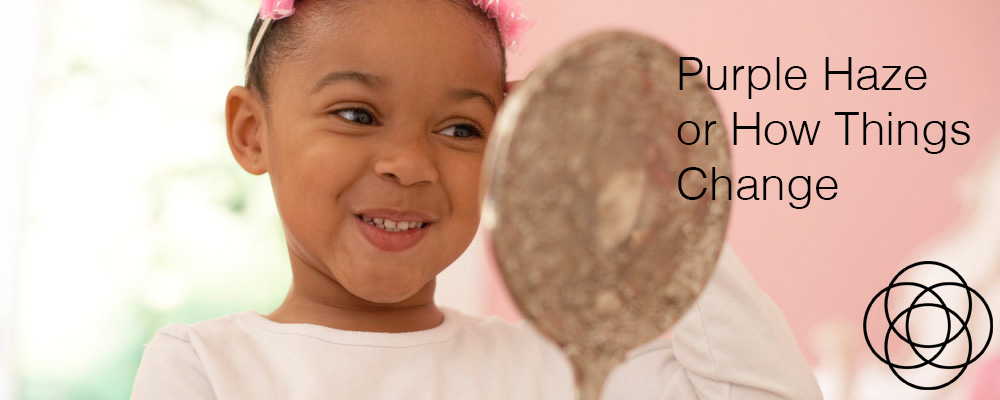Picture this: You look into the mirror at three years old and recognise yourself. The next day the mirror tells the same story. And the next and the next. Okay, so one day a tooth falls out and your mirror picture shows you without your tooth, but otherwise nothing has changed. Day by day, year by year, the mirror tells the same story, “Yep. This is you. Much the same as yesterday really.”
Roll on a few decades. Today’s face in the mirror might look a little tired compared to yesterday’s after a big night out. Tomorrow’s face might look younger, well-slept but, hey … much the same as yesterday really.
Day by day your face in the mirror looks the same, yet so many momentous changes have taken place since you were three. Even the longest-lived of your body cells is replaced every six or seven years, so your body has totally regenerated many times. But did you notice the changes? When did it all happen?
When you interpret and work with your dreams, a similar process occurs.
Day by day, night by night, your dreams hold up a mirror for you to scrutinise your reflection. “This is who you are. These are the feelings you try to hide. This is what motivates you. These are the gifts you are too shy to shine. This is what hinders you. These are your buried hurts, your weeping wounds – see how they still shape your relationships. These are the beliefs about life that you have learned from others – see how they affect your vision. This is your mask – when will you take it off?”
Little by little, you begin to see truths about yourself, and begin to understand why your life is the way it is. Small changes begin, often too small to notice on a day to day basis but they add up to momentous changes over months and years. You gather confidence in sharing your talents, you free yourself from hurt by forgiving the past, you let go of beliefs that have not been serving you well, and you begin to see solutions instead of problems, doorways instead of brick walls.
I remember the time I bought my first Polaroid prescription sunglasses. My first trip out wearing them was exactly that – way trippy man! Everything was edged in a purple and green haze. Short walks distended into prolonged contemplations of clouds and flowers, while driving along psychedelic purple-green roads was distractingly dangerous.
The next summer I realised something amazing. I noticed that the purple and green hazes had gone. Everything looked normal through the very same sunglasses. But when had all this happened?
In terms of science and biology, my brain had become habituated. It had decided, without consulting my preferences, that the world wasn’t really as purple or green as my glasses seemed to suggest, so it deleted that input as irrelevant and possibly harmful to my survival. My brain made the executive decision to choose a world-picture that, in its opinion, fitted reality better than the reality portrayed by Polaroid lenses that bend and change the angles of some colours more than others.
Why did my brain make this autonomous executive decision?
It’s all about survival. Have you ever bought a new alarm clock and been kept awake by its loud ticking? In only a few days, the tick-tock disappears, until you listen very closely, and then you hear it again. What happens is that when you first get the clock your brain hears the tick and stays on alert in case the ticking is a predator keen on eating you while you sleep. As time goes by, your brain decides that this ticking is obviously not a danger, so it habituates to the sound – it makes an executive decision to change your reality to one with a silent alarm clock so that you can sleep undisturbed. You no longer hear the tick consciously, although it lives on in your all-seeing, all-hearing unconscious mind, just as my unconscious mind is deeply bathed in psychedelic purple and green whenever I wear my sunglasses.
A more disturbing example of habituation was described to me by a woman who had just been persuaded to leave a violent marriage. During earlier counselling she had been asked if her husband was violent. She had replied no. She was then asked specific questions, such as ‘When did your husband last hit you?’. Her answers clearly indicated a violent marriage, but she had experienced the violence for so long that she had accepted it as normal, not as violent.
Her counsellor opened her eyes by telling her how to kill a frog. If you put a frog into very hot water, it immediately jumps out to save itself. If you put a frog into tepid water, and then slowly raise the temperature, it doesn’t notice the series of small changes and eventually overheats and dies.
If this woman had been following and interpreting her dreams she would have been awake to her situation much earlier, discovering both self-understanding and empowerment make a change. No matter how much the brain habituates and screens the senses, no matter how much is deleted from the conscious mind, the unconscious records everything and reveals it in dreams.
By now there must be a huge question on your lips. If the brain habituates to a ticking alarm clock or to purple-green hazes to protect our survival, what on earth is the survival advantage in habituating someone to a violent marriage?
The answer is historical. The brain treasures its archives. Your early life experiences and memories helped to create your fundamental beliefs about life and survival. For example, you might have experienced more contact and care from your mother when you were sick, so you learned that sickness is a good survival tool. Or you might have learned that doing what you were told was better than getting slapped, so you learned that obedience was a good survival tool. Or you might have learned that a parent gave you more loving attention after hitting you (in regret) than before, so you learned that accepting violence was a good survival tool.
In the following years, your brain has done its habituating based on your list of good survival tools securely treasured in the archives of your mind.
For life-enhancing change to be really effective, your fundamental beliefs need to be identified and re-evaluated. Your survival tools need to be sorted through and updated. Many need to be disposed of and replaced. Your dreams are the place to start to do this.
Be ready to kiss a frog or two.

